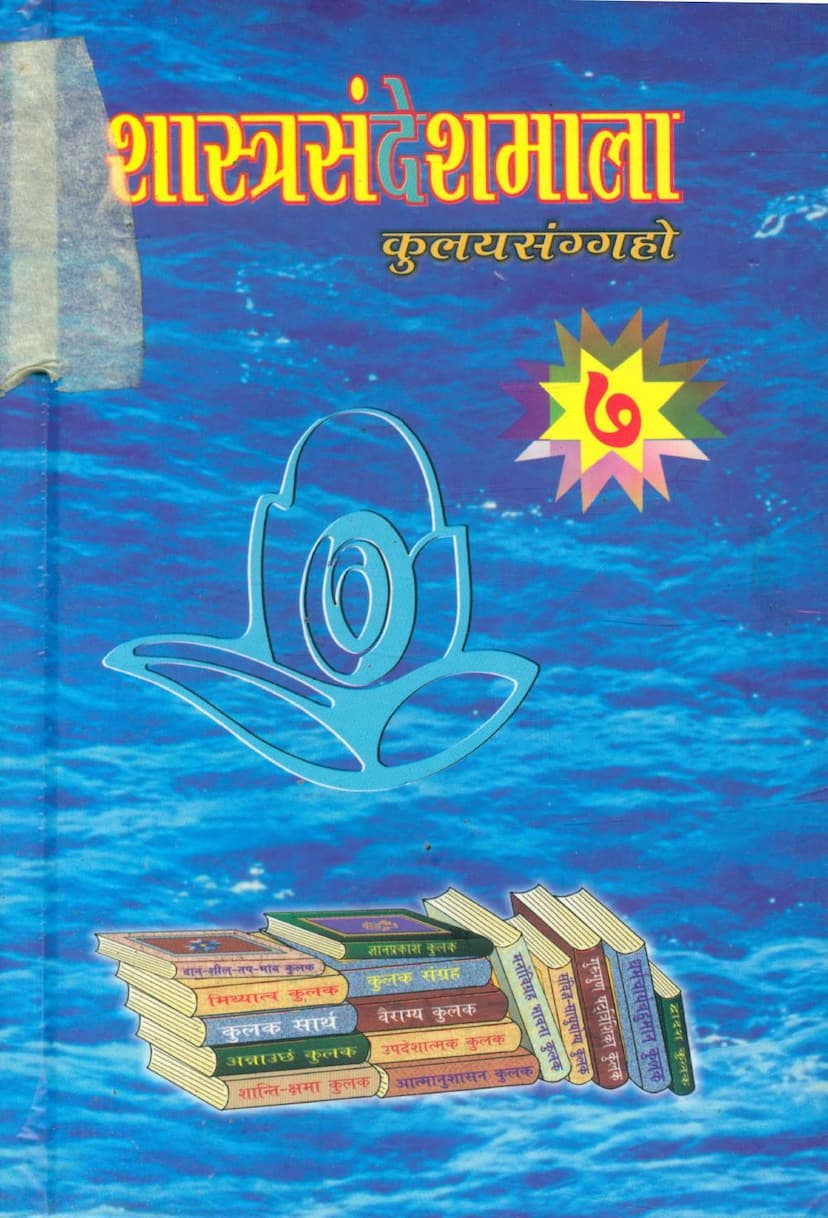Shastra Sandesh Mala Part 07
Added to library: September 2, 2025

Summary
Here's a comprehensive summary of the Jain text "Shastra Sandesh Mala Part 07" by Vinayrakshitvijay:
Overall Purpose:
"Shastra Sandesh Mala Part 07," part of the larger "Shastra Sandesh Mala" series published by Shastra Sandesh Mala, is a compilation of various Jain texts, primarily in verse (padyam). Its aim is to present valuable Jain literature in a new, accessible format, drawing from over 400 ancient texts and approximately 70,000 verses composed by esteemed Jain scholars. The series intends to provide spiritual guidance and promote Jain principles.
Author and Publisher:
- Author: P.M. Shri Vinayrakshitvijayji M.S.A. (a disciple of P. Pannyas Shri Bodhiratna Vijayji M.S.A.).
- Publisher: Shastra Sandesh Mala, Surat.
Compilation and Guidance:
The compilation was prepared under the complete guidance of P. Pannyas Shri Taporatna Vijayji M.S.A. The work emphasizes purity and accuracy, with rigorous proofreading and correction undertaken by esteemed scholars and monks.
Content and Structure:
The book contains a vast collection of "Kulakas" (short, thematic verses or poems) covering a wide range of Jain philosophical concepts, ethical teachings, and devotional topics. The table of contents reveals a diverse array of subjects, including:
- Core Principles: Navkar Phal Kulakam, Samyaktva (Right Faith) Kulakam (in multiple parts), Ratnatray Kulakam.
- Ethical Conduct: Dan Kulakam (Charity), Sheel Kulakam (Morality), Tapah Kulakam (Austerity), Bhav Kulakam (Mental Disposition), Brahmacharya (Celibacy), Daya (Compassion), Kshama (Forgiveness), Kshanti (Patience).
- Spiritual Guidance: Upadesh Kulakam (Advice) in various forms, Viveka Kulakam (Discernment), Atma Bodh Kulakam (Self-Realization), Mano Nigrah Bhavana Kulakam (Mind Control), Atma Shastra Kulakam (Self-Discipline).
- Biographies and Devotion: Stories and praises of Tirthankaras, great monks (Sadhu), nuns (Mahasati), and devout laypeople (Shravak, Shravika). Examples include Shri Gautam Kulakam, Dash Shravak Kulakam, Maha Sati Kulakam.
- Practices and Observances: Pavvaja Vidhan Kulakam (Rules of Renunciation), Padilehana Vichar Kulakam (Rules of Examining Utensils), Mukhavastrika Sthapan Kulakam (Placement of Mouth Cloth), and various aspects of monastic discipline and daily conduct.
- Philosophical Concepts: Karma Vipak Kulakam (Consequences of Karma), Mithyatva Kulakam (False Belief), Vairagya Kulakam (Detachment), Shastra Sandesh Mala (Message of Scriptures).
- Respect for Gurus: Guru Darshan Harsha Kulakam (Joy of Guru's Sight), Guru Gun Shattrishat Shattvishika Kulakam (Thirty-six Virtues of Guru).
- Other Important Topics: Mangal Kulakam (Auspiciousness), Puny Kulakam (Merit), Shok Nivaran Kulakam (Sorrow Removal), Dharma Charya Bahuman Kulakam (Respect for Religious Leaders), Dvadaś Kulakam (Twelve Types of Kulakas).
The book is meticulously organized with an extensive index listing 83 distinct Kulakas, covering a broad spectrum of Jain thought and practice.
Key Themes and Teachings:
- Renunciation and Detachment: A significant emphasis is placed on detachment from worldly pleasures, material possessions, and sensory desires, highlighting their impermanent nature and the suffering they ultimately bring.
- Spiritual Discipline: The importance of adhering to the principles of Jainism, including right faith (Samyaktva), right knowledge (Samyak Gyana), and right conduct (Samyak Charitra), is repeatedly stressed.
- Austerity and Moral Conduct: Various forms of penance, self-discipline, charity, and virtuous behavior are presented as pathways to spiritual progress.
- The Role of the Guru: The teachings of the Guru are considered paramount, and profound respect and adherence to their guidance are encouraged for spiritual attainment.
- The Nature of Karma: The text delves into the concept of karma, illustrating how past actions influence present circumstances and future rebirths.
- The Impermanence of Life: The book consistently reminds readers of the transient nature of life, the body, and worldly relationships, urging them to focus on spiritual goals.
- The Power of the Navkar Mantra: The Navkar Mantra is presented as a potent spiritual tool for overcoming obstacles and achieving spiritual progress.
- Ethical Living for Laypeople: While many teachings are directed towards ascetics, the principles of ethical conduct, charity, and devotion are also relevant for lay followers.
Appreciation and Acknowledgments:
The publication acknowledges the generous support of various Jain Sanghs and trusts, particularly the Shri Surat Tapgachh Ratnatrayi Aradhak Sangh, which provided financial assistance from their "Gyan Dravya" (knowledge fund). Special thanks are extended to various libraries and institutions for providing access to rare manuscripts, enabling the meticulous compilation of the series. The dedication and effort of the typographers, designers, and printers are also recognized.
Overall Significance:
"Shastra Sandesh Mala Part 07" serves as a valuable resource for Jains seeking to deepen their understanding of their faith. It offers a rich tapestry of Jain wisdom, presented in a structured and accessible manner, intended to inspire spiritual growth and adherence to Jain ideals. The sheer volume and diversity of the Kulakas covered demonstrate the breadth and depth of Jain literature.